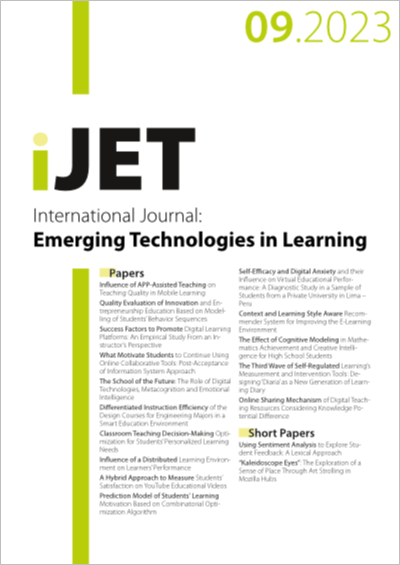Classroom Teaching Decision-Making Optimization for Students’ Personalized Learning Needs
DOI:
https://doi.org/10.3991/ijet.v18i09.40233Keywords:
students' personalized learning, learning needs, classroom teaching decision-making, multi-objective decision-making optimizationAbstract
Classroom teaching is the basic form of teaching in colleges and universities. Teachers need to constantly optimize classroom teaching decision-making to adapt to the ever-changing educational environment. In order to improve the quality of teaching, stimulate students' potential, and promote students' all-round development, it is necessary to fully consider the personalized needs of students in classroom teaching and provide more suitable teaching content and methods for them. To this end, this article takes the accounting major in higher vocational colleges as an example, and conducts a study on the optimization of classroom teaching decision-making for students' personalized learning needs. It introduces the psychological curve function based on expected performance and current performance to measure the satisfaction degree of students' personalized learning needs, and as an evaluation of whether students' personalized learning needs meet expectations, elaborates on the calculation method of expected performance and current performance of personalized learning. A multi-objective decision-making model for classroom teaching is constructed to achieve the three optimization objectives of maximizing the quality of classroom teaching, maximizing the attention of students' personalized learning needs, and maximizing students' dissatisfaction, and the solution method of the model is given. Experimental results verify the effectiveness of the proposed algorithm and the constructed model.
Downloads
Published
How to Cite
Issue
Section
License
Copyright (c) 2023 Nan Zhang (Submitter); Liyang Li

This work is licensed under a Creative Commons Attribution 4.0 International License.



